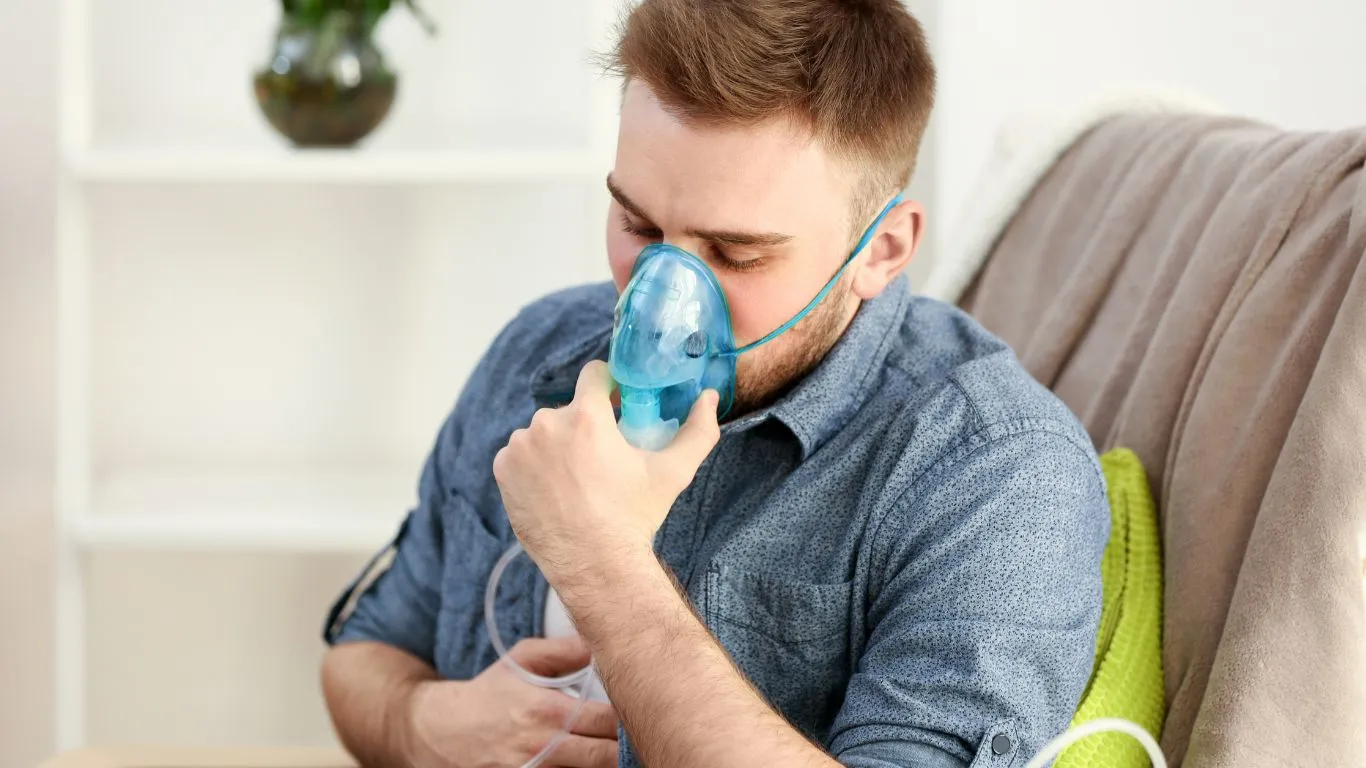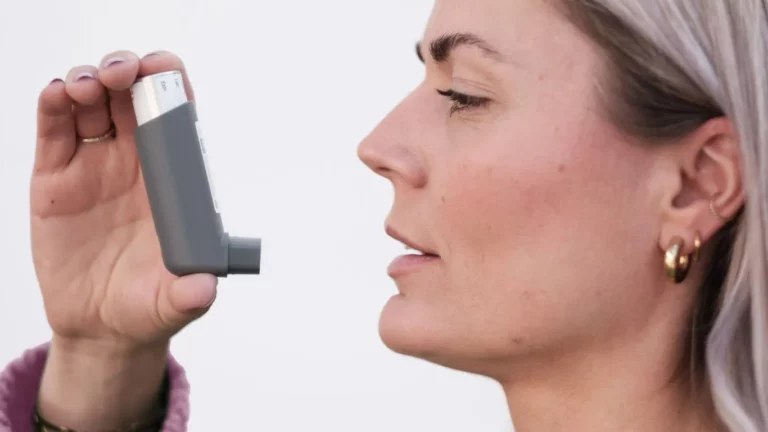Breathe Easier: Can Asthma Cause Feeling of Air Hunger? Find Relief
If you’ve ever had that frustrating sensation where you’re trying to take a deep breath but it just doesn’t feel like it’s going in all the way — you’re not alone. I’ve had countless patients ask, “Why do I feel like I can’t get enough air even when I’m breathing?” And the answer isn’t always simple. But one of the most common culprits? Asthma. So, can asthma cause feeling of air hunger? Absolutely, yes. As a pulmonary nurse practitioner, I’ve seen this countless times. It’s not just wheezing or coughing — air hunger is a very real and very unsettling part of the asthma experience for many folks.
What Exactly Is “Air Hunger”?

Let’s break this down in human-speak. “Air hunger” is that distressing feeling where you’re breathing — but it still feels like you’re not getting enough oxygen. Imagine your body gasping for a deep breath, but it’s like hitting a wall. It’s not quite shortness of breath, and it’s not the same as being winded after a sprint. It’s more like your lungs are screaming for more, but no matter how much you inhale, it’s not enough.
I remember one patient, a woman in her early 30s, who had well-managed asthma most of her life. Then one day, she told me it felt like she “couldn’t fill her lungs.” No wheezing, no coughing. Just that intense, scary feeling of suffocating from the inside. We ruled out heart issues, anxiety, even GERD. And sure enough — her asthma was flaring up in a sneaky way, causing that invisible but intense air hunger. This is something I always teach my patients: asthma symptoms don’t always follow the textbook.
How Asthma Triggers the Sensation of Air Hunger

So let’s geek out for a second (don’t worry — I’ll keep it real). Asthma is a chronic inflammatory condition that affects the airways in your lungs. When you’re having a flare-up or are exposed to a trigger, those airways get inflamed, swollen, and tight. And when that happens, less air can pass through.
Now, here’s where the feeling part comes in. Even if your oxygen levels are technically okay, your brain senses the increased effort of breathing and goes into alert mode. That triggers the sensation of air hunger. Your lungs are working overtime, and your brain’s basically saying, “Whoa, we’re not getting enough here!”
Common Asthma-Related Causes of Air Hunger
- Bronchoconstriction: When your airway muscles tighten, airflow drops. You breathe harder, but it still feels like you’re not getting enough.
- Mucus buildup: Thick mucus can block parts of your airway, making every breath feel like a struggle.
- Hyperventilation: This might sound backward, but breathing too fast — often due to anxiety or panic — can actually make that breathless feeling worse.
From what I’ve seen in practice, these symptoms can creep up slowly or hit suddenly. And not everyone wheezes! That’s what makes diagnosing it tricky sometimes. I always tell my patients: if something feels off with your breathing, even if it’s not “classic” asthma, trust that gut feeling and speak up.
When to Worry: Is It Just Asthma or Something Else?

This part is crucial — because yes, asthma can cause that feeling of air hunger, but other conditions can too. And sometimes they overlap. I’ve worked with patients who had both asthma and anxiety, and one can feed the other. That tight chest and shallow breathing can spark panic, which just makes everything worse.
- Anxiety and panic attacks: These can mimic or worsen asthma symptoms. The key difference? With anxiety, you might feel like you’re suffocating, but your oxygen levels are usually normal.
- Heart conditions: Congestive heart failure and other cardiac issues can also lead to breathlessness or air hunger. I always say, better safe than sorry — get checked.
- Vocal cord dysfunction: This sneaky one can feel just like asthma, but it involves the throat, not the lungs. I’ve caught this in more than a few patients who weren’t improving with asthma meds.
Bottom line? Asthma is definitely a top reason behind that frustrating feeling of air hunger, but it’s not the only possibility. That’s why a good assessment — and a healthcare provider who listens — is everything.
How It Really Feels — More Than Just “I Can’t Breathe”

Let me tell you, hearing someone say “I can’t get a deep breath” hits differently when you’ve actually seen that fear in their eyes. It’s not always the dramatic gasping we see on TV. Sometimes it’s subtle — a quiet pause mid-sentence, frequent sighing, or just a desperate need to yawn. I had a patient who kept telling me, “I feel like I need to stretch my lungs out.” That’s exactly what air hunger can feel like. Not overt panic, just this constant, gnawing discomfort that something’s not right.
And that’s why it’s so important not to brush it off — especially if you have asthma or a history of lung issues. I’ve seen folks chalk it up to stress, allergies, or being out of shape. But when we finally dig into it, there it is: asthma quietly stirring up trouble without the usual wheeze-and-cough fanfare.
Real Talk: How to Manage Air Hunger from Asthma

So here’s the part everyone wants to know — what do I do if asthma is causing that air hunger feeling? The short answer? You manage the asthma like your quality of life depends on it — because it does. The long answer? It’s a combination of prevention, smart medication use, and lifestyle tweaks. And yes, a little bit of detective work, too.
- Know your triggers: Allergens, cold air, exercise, stress — anything that flares your asthma can lead to that tight, breath-hungry feeling. Track your symptoms. Write them down. Patterns matter.
- Stick to your controller meds: This one’s big. Rescue inhalers help in the moment, but controller medications reduce inflammation long-term. I’ve seen major improvement just by helping someone use their inhalers properly.
- Don’t guess — measure: Peak flow meters are game changers. They show how well air is moving out of your lungs, even when you *feel* okay. I use them to catch flares early — before air hunger takes over.
I remember working with a teenager who thought her air hunger was “just anxiety.” She was barely using her controller inhaler. Once we started tracking her peak flows and adjusted her meds, the air hunger episodes dropped off dramatically. That’s why education is everything — understanding your body gives you control.
When Air Hunger Becomes an Emergency

Alright, we’ve got to talk about the red flags. Most of the time, air hunger from asthma is manageable — uncomfortable, but not dangerous. But sometimes, it’s your body’s warning signal that something more serious is going on.
Signs You Should Head to the ER
- Using your rescue inhaler more than every 4 hours with little relief
- Struggling to speak full sentences without gasping
- Chest feels tight and nothing helps
- Your lips or fingernails look bluish
- You’re sitting upright just to breathe
In my clinical work, I’ve seen patients delay treatment because they thought they were just anxious or tired. But asthma doesn’t play fair. It can sneak up and turn serious fast. If you’re ever unsure, go get checked out. It’s always better to get evaluated and sent home than to wait too long.
And please — don’t rely solely on how you “feel.” I’ve seen patients whose oxygen levels were dropping but they didn’t feel breathless yet. Asthma can mask symptoms. That’s why objective tools like pulse oximeters and peak flow meters are so important. They don’t lie, even when your brain tries to tell you it’s no big deal.
Why Doctors (and Patients) Sometimes Miss It
This is something I feel passionate about. Can asthma cause feeling of air hunger? Yes — but too often, it gets dismissed or misdiagnosed. Why? Because it’s not always loud. Air hunger doesn’t always come with wheezing, coughing, or visible distress. And unless you know what to look for, it’s easy to brush it off as “just anxiety” or “overexertion.”
I’ve had folks come in after seeing multiple specialists, being told their lungs were fine — but no one really listened to how they were *feeling*. That’s why I always ask deeper questions during a visit: “Does it feel like you can take a full breath?” “When did that start?” “Do you feel better sitting or standing?”
That level of detail matters. That’s what builds trust. And that’s where real healing starts — when we validate someone’s experience instead of brushing it under the rug.
Taking Back Control: Living Fully Despite Asthma & Air Hunger

Here’s the thing no one tells you — feeling in control of your asthma is just as important as the meds you’re prescribed. Because when symptoms like air hunger show up, they don’t just affect your lungs, they mess with your confidence. I’ve seen patients stop going on hikes, skip workouts, even avoid social events, all because they were scared they wouldn’t be able to breathe right.
And that’s what I really want to emphasize here: you can absolutely live a full, active life with asthma — even if air hunger has been part of the picture. The key is knowing your body, building a care plan that fits your life, and making small tweaks that add up over time.
What Helps My Patients Feel Empowered
- Asthma Action Plans: A clear, step-by-step guide for what to do when symptoms flare. I personalize these for every patient, and it makes a huge difference in reducing anxiety and uncertainty.
- Breathing techniques: Diaphragmatic breathing, pursed-lip breathing — these aren’t just for yogis. They’re practical, evidence-based ways to calm air hunger during mild flares.
- Support systems: Whether it’s a trusted provider, online group, or asthma buddy, having people who “get it” makes everything less scary.
I always say this: asthma doesn’t define you. You define how you manage it. And I’ve seen incredible resilience in my patients once they learn what’s going on in their body and how to respond without panicking. It turns fear into confidence — and that’s powerful.
Holistic Approaches Worth Exploring

Let me be clear — I’m all for science-based medicine. But that doesn’t mean there’s no room for a little holistic support too. Plenty of my patients have found relief through complementary therapies — especially when traditional approaches weren’t cutting it alone. Just always check with your provider first before diving in.
Alternative Options My Patients Have Tried (and Loved)
- Acupuncture: Some studies suggest it may reduce inflammation and calm nervous system responses that worsen air hunger.
- Buteyko breathing method: This technique focuses on reducing over-breathing and calming breath rate, which can help with that “not getting enough air” sensation.
- Mindfulness and meditation: Not a cure, but it helps reduce anxiety-driven breathing issues, which often worsen that tight-chested feeling.
I had a patient who swore her weekly yoga class was just as important as her inhaler. And honestly? I believe her. When you’re tuned in to your body and working with it — not against it — you notice changes faster and handle them better.
Final Thoughts: Can Asthma Cause Feeling of Air Hunger?
Let’s circle back to the original question: Can asthma cause feeling of air hunger? Without a doubt, yes. But more importantly, it doesn’t mean you’re powerless. I’ve seen this symptom make people feel like they’re drowning in their own lungs. But I’ve also seen those same folks thrive once they understood what was happening — and had the right tools to manage it.
If there’s one thing I hope you take away from this, it’s this: your symptoms are valid. That sensation of not getting enough air isn’t “in your head,” and it’s not something you just have to live with. Asthma may be invisible, but it’s not silent. And you deserve care that listens, that sees you, and that helps you breathe — literally and figuratively — easier.
References
- Asthma and Allergy Foundation of America (AAFA)
- American Lung Association
- Centers for Disease Control and Prevention (CDC)
- National Heart, Lung, and Blood Institute
Disclaimer
This article is for informational purposes only and should not be considered medical advice. Always consult your healthcare provider or a qualified medical professional for personalized guidance. As a pulmonary nurse practitioner, I’ve shared insights based on clinical experience, but every patient is unique — and your care should be, too.

Bianca Nala is a compassionate Nurse Practitioner with a strong background in primary and respiratory care. As a health writer for Healthusias.com, she combines her clinical expertise with a talent for clear, relatable storytelling to help readers better understand their health. Bianca focuses on topics like asthma, COPD, chronic cough, and overall lung health, aiming to simplify complex medical topics without losing accuracy. Whether she’s treating patients or writing articles, Bianca is driven by a single goal: making quality healthcare knowledge accessible to everyone.







